Contents
One of the most important and crucial stages in growing tomatoes in the open field is planting seedlings. The future harvest depends on whether the tomatoes are planted correctly. Preparing tomato seedlings
To increase the number of successfully established plants, it is advisable to harden off tomato seedlings before planting in open ground. To do this, about two weeks before planting, it is necessary to create conditions for tomato seedlings similar to those in which it is to grow. The ideal option is to take out tomato seedlings into the open air, gradually increasing the residence time. Adaptation can take up to 10 days, during which time tomato seedlings get used to sunlight and temperature changes. If frost is not expected, you can leave tomato seedlings outside for the night.
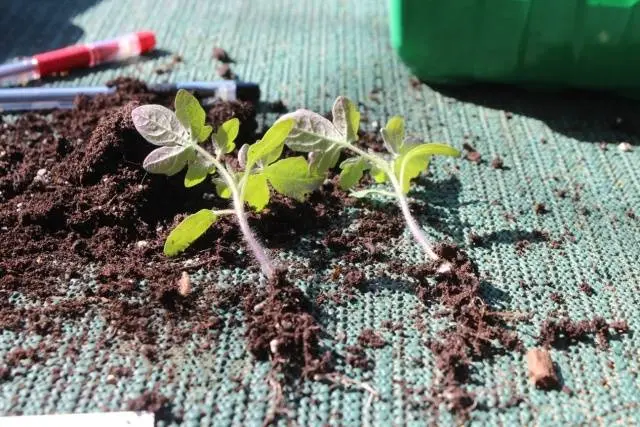
The hardened seedlings of tomatoes differ from the greenhouse color of the leaves – they acquire a purple hue. This should not cause concern, the tomato is not sick, it is a reaction to bright sunlight. Planting tomato seedlings in open ground does not cause any complications in this case.
Tomatoes are heat-loving plants, at low temperatures the root system ceases to function normally, immunity decreases, seedlings become vulnerable to various fungal diseases.
A day before planting, it is advisable to pour tomato seedlings; it is easier to get a tomato from liquid soil without damaging the roots. Do not be afraid of the negative impact of waterlogging – nothing catastrophic will happen in such a short period.
If tomato seedlings were grown in cups, they are transplanted with a preserved root system. In this case, on the contrary, watering the tomato is stopped a week before planting. A dried earth lump is easier to get out of the cup without damaging the roots.
You can treat tomato seedlings with special plant stimulants before transplanting. Their action is based on an increase in the amount of phytohormones in the leaves of tomatoes, which reduce the impact of stress factors on the plant. Potash fertilizers also help to increase the endurance of tomatoes, as a rule, they are sprayed with leaves a day before planting.
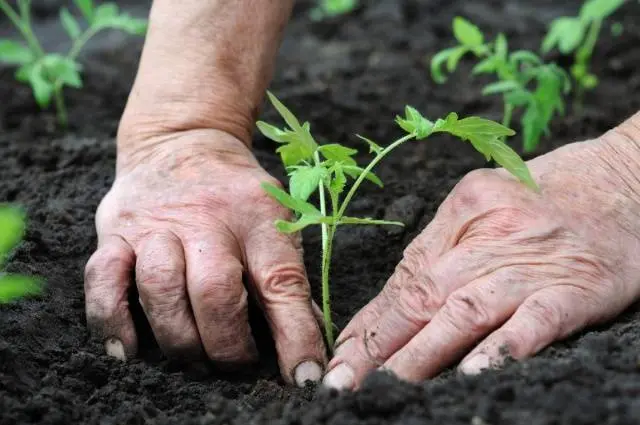
Planting dates
Planting tomatoes in open ground begins when the soil warms up to 15 degrees at a depth of 40 cm. If you plant tomato seedlings earlier, it will be difficult for the root system to start recovery, since nutrient absorption stops at low temperatures. Prolonged exposure to low temperatures can kill the tomato.
Planted too early in unheated soil, tomatoes can be affected by various fungal diseases, such as late blight. The root system develops slowly, the supply of nutrients to the green parts of the tomato is difficult. The productivity of such tomatoes can be significantly reduced.
Popular observations claim that you can navigate when planting seedlings of tomatoes by birch leaves. If all the leaves on the birch have already blossomed, then the earth has warmed up enough, and you can start planting tomato seedlings. In the southern regions, attention is paid to the singing of cicadas. When the chirring becomes loud and continuous, seedlings are planted.
In any case, when deciding when to plant tomato seedlings in open ground, weather conditions must be taken into account. In the same area, suitable conditions for planting tomatoes in the ground can vary significantly.
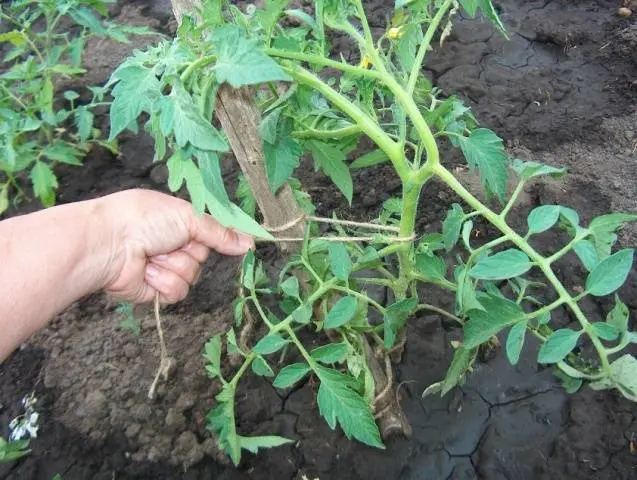
In most regions, planting tomatoes in open ground begins in the first half of May. It is advisable to take care of the shelter of tomatoes in advance in case of frost. This is necessary not only for the northern regions, but also for the southern ones, the weather of which is unpredictable and the appearance of return frosts in May is not uncommon, especially in mountainous areas.
Age of tomato seedlings
The ideal age of tomato seedlings for planting in the ground depends on the characteristics of the variety. Early maturing tomatoes can be planted when the seedlings reach the age of 30 days, late varieties of tomatoes are planted at the age of 45 days.
The terms may differ by 5 – 7 days, this will not have a special effect on the further development of tomatoes. The main thing is a well-developed root system, thanks to which the growth of tomato green mass will not be delayed.
Often it is impossible to accurately determine the age of purchased tomato seedlings. In this case, you need to pay attention to the appearance of tomatoes. Properly grown tomato seedlings have a short, thick trunk with 6 to 8 leaves. The roots of good tomato seedlings are about half the size of a stem. The leaves should be bright, may have a bluish tint, this indicates that the tomato seedlings have been accustomed to the sun’s rays.
If it is impossible to accurately observe the recommended planting dates for tomatoes in the ground, it is better to plant a younger plant than an overgrown one. A young plant adapts more easily; it will take a little time to restore the root system.
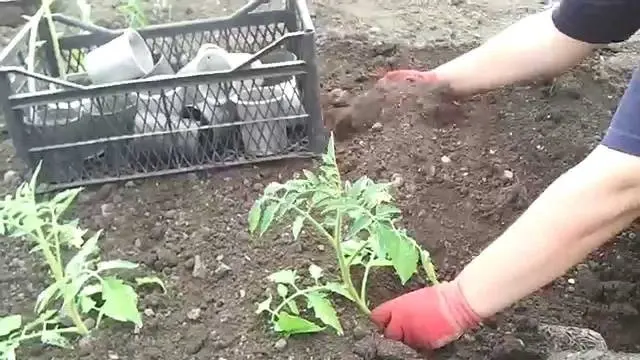
Planting overgrown seedlings of tomatoes has some features. It is advisable to transplant such seedlings without disturbing the earthen ball. The hole for planting overgrown tomato seedlings is dug deeper than usual, given the large root system and long stem. The plant is planted vertically in the ground, deepening the stem part by about a third. Some gardeners plant such tomatoes at a slight angle, citing the fact that in this position the tomato forms a more branched root system.
Soil preparation
Soil preparation for planting tomatoes begins in the fall, after the last crop is harvested. The earth is cleared of stems and leaves, complex fertilizers are applied. After that they dig.
Many gardeners prefer to dig a garden when the weather is stable and frosty. Insect larvae hiding in the ground are brought to the surface during digging, where they die from low temperatures. The roots of perennial weeds also freeze.
To improve the soil, it is advisable to sow green manure in the beds, for example, alfalfa, every few years. They enrich the soil with nutrients, reduce the amount of harmful salts, and reduce the content of pathogens.
Soil acidity is important for the healthy development of tomatoes. In soils with high acidity, plant roots can hardly absorb nutrients. All parts of the tomato experience starvation, the growth of the plant stops. To determine the acidity of the soil, you can purchase special test strips. They are sold in many gardening stores. If the reaction of the soil turned out to be acidic. It is necessary to introduce special substances into the soil that will reduce acidity. One of the most affordable is lime.
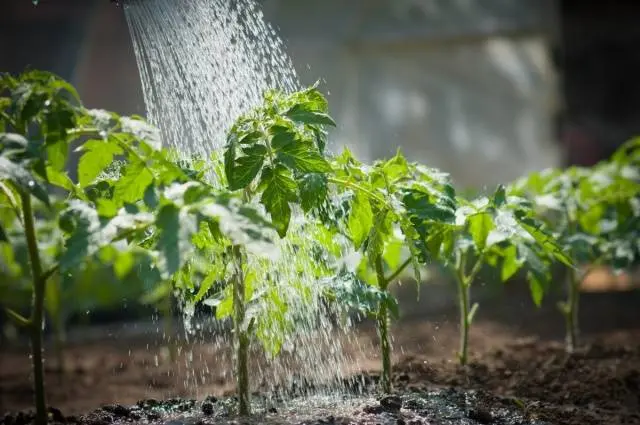
For normal growth, tomatoes need the following substances:
- Nitrogen;
- Magnesium;
- Bor;
- Potassium;
- Calcium;
- Iron.
You can make ready-made complex fertilizers, consumption rates for tomatoes are usually indicated in the instructions. The convenience of this method is that it is easy to dose nutrients, while observing the recommended norms, it is impossible to add extra fertilizers.
Despite this, many gardeners prefer to make do with natural nutrients such as peat, humus, manure, and ash. When using organic fertilizers, care must be taken as excessive application of manure can cause excess nitrogen in the soil.
It is necessary to apply organic fertilizers in the fall so that the chemical elements have time to penetrate into the soil. Introduced in the spring, they will have nutritional value only for the next year.
Mulching tomato seedlings
Mulch is a dense layer of organic or artificial material that covers the soil around plants. The main purpose of mulch is to protect the soil from drying out. In addition, a dense layer of mulch prevents the growth of weeds. The correct use of mulching materials makes it much easier to care for plants, the soil does not need to be loosened, since there is no soil crust, weeds do not need to be weeded, the number of irrigations is halved.
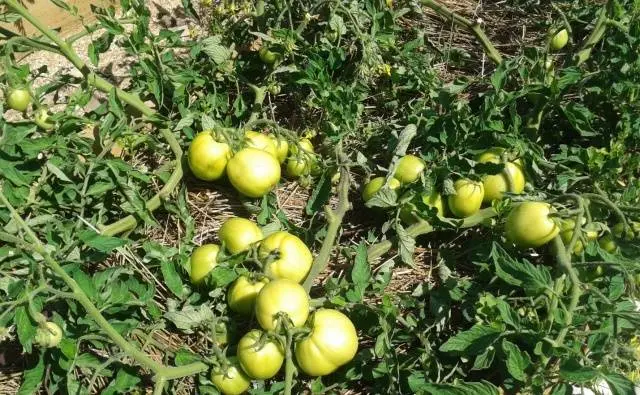
Mulch cover the soil immediately after planting tomato seedlings. This coating allows the seedlings to adapt faster, because the soil under the mulch has a constant moisture content. Of the mulching materials, the following are most common:
- Straw;
- Sawdust;
- mowed grass;
- Black polyethylene film;
- Cardboard.
Despite all the advantages of mulch, it must be used carefully, especially in the northern regions. Covering with a dense material reduces the temperature of the soil by 2 – 4 degrees; in the cold or rainy season, the roots of plants can rot. In this case, be sure to remove the mulching material and allow the soil to dry out.
Rules for planting tomato seedlings
For planting tomatoes, it is advisable to choose a sunny area, which is located on a small hill. The site should not be in a damp place, tomatoes do not tolerate excess moisture. It is advisable to create a good drainage system to protect the tomatoes from heavy rains.
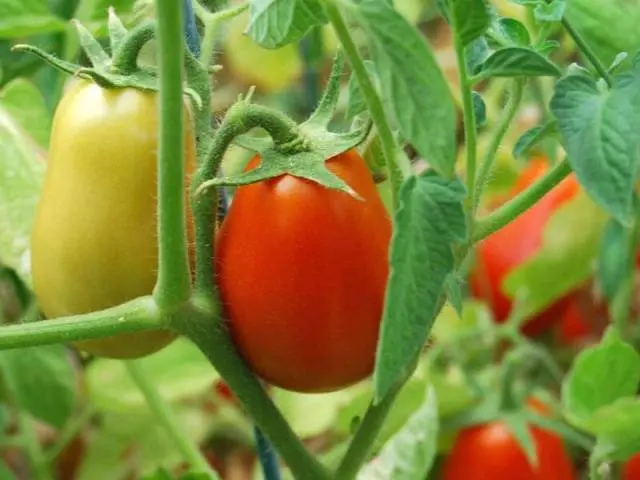
The best predecessors for tomatoes:
- Legumes – beans, peas;
- Green crops – parsley, celery, cilantro;
- Root crops – beets, carrots;
- Cereals.
It is undesirable to plant tomatoes after potatoes, it also belongs to nightshade and has diseases in common with tomatoes. It used to be recommended to plant tomatoes after cucumbers, new research shows this statement to be false.
Holes are dug in advance, and immediately watered. So, the soil warms up deeper, the roots of tomatoes will develop better and faster.
In such beds, the soil warms up faster, including due to organic matter placed on the bottom of the bed. This method is not suitable for the southern regions, as the root system of tomatoes overheats.
The distance between the dug holes is determined, taking into account the size of an adult, well-developed plant. For undersized tomatoes, 30-40 cm between the bushes is enough, they are planted in two rows in a checkerboard pattern. Between the beds you need to leave a passage of at least 50 cm.
It is desirable to plant seedlings of tomatoes in open ground in the evening or in cloudy weather. You can not plant tomatoes on a hot sunny day and in strong winds.
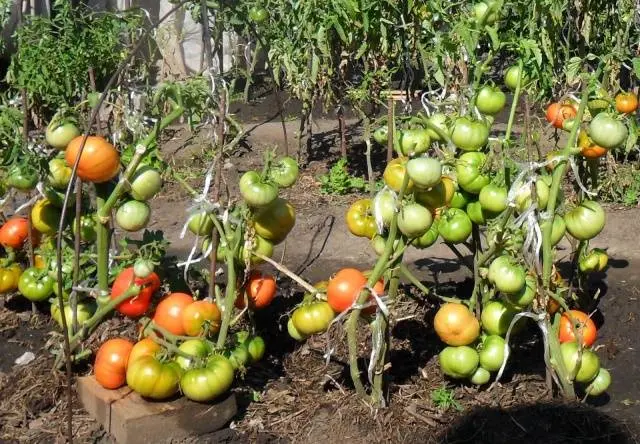
Tomato seedlings are placed in the hole, deepening the tomato trunk by a third, immediately watered. The earth around the seedling must be pressed tightly so that no air cavities remain. You can sprinkle the planted seedlings with mulch so that after abundant watering a soil crust does not form. The mulching layer must be at least 2 cm.
Carefully following the recommendations will help reduce the hassle of growing tomatoes outdoors and ensure a good harvest.









